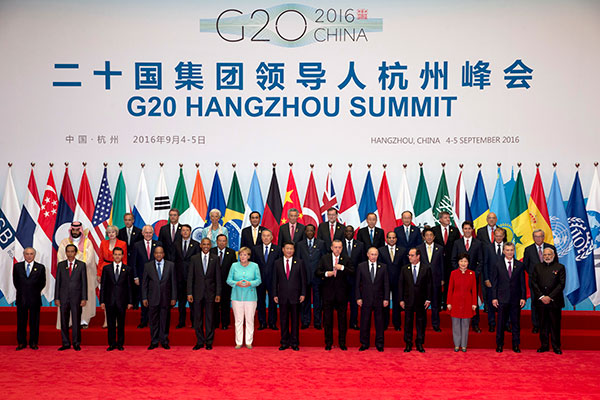Global cooperation can make a difference
Updated: 2016-09-05 07:27
By Yi Fan(China Daily)
|
|||||||||
 |
|
Leaders pose for pictures during the G20 Leaders Summit at the Hangzhou International Expo Center in Hangzhou, East China's Zhejiang province, on Sunday. WU ZHIYI/CHINA DAILY |
Globalization was hailed as being the path toward greater shared prosperity. Things, however, started to change at the turn of this century, and the trend of anti-globalization has been gaining momentum.
There has been a growing wave of anti-globalization, anti-elitism, anti-establishment and the reemergence of populist politics in many countries. Brexit was a blunt rejection of Europe by those in Britain who complained about the influx of foreigners and the lack of jobs. A similar story can be seen across the Atlantic with the rise of US Republican presidential candidate Donald Trump, who has clearly won the support of those who complain about job losses, the influx of foreigners and the country's waning competitiveness.
And most of the world's major economies, notably advanced ones, are resorting to protectionist measures as the global economic slowdown bites harder. The WTO Doha round of negotiations has long been at an impasse. Both presidential candidates in the United States are promising what would be tantamount to a US exit from the global trading system.
There are a number of underlying causes for the anti-globalization movement: insufficient macroeconomic policy coordination among countries has left the existing international economic and financial governance system inefficient and ineffective; the sluggish global economic recovery and slow growth are undermining the case for open markets that globalization rests on; social endeavors, including poverty reduction, and better human rights and labor standards, lag behind across the world. Moreover, the benefits of globalization remain highly concentrated in a few countries and among the upper echelon of society.
At the same time, terrorism and political instability are slowing down the globalization process. The sense of insecurity that terrorism provokes and the fear that liberal standards are facilitating terrorism and that porous borders are allowing terrorists to enter target countries have caused the US and the members of the European Union to seek greater control over cross-border movements. And the spillovers of increasing geopolitical instability have added to people's sense of insecurity and prompted them to look inward.
However, the bottom line is, like it or not, we all live in a globalized world. Against such a backdrop, all eyes are now on the G20 Hangzhou Summit to deliver some answers.
Related Stories
Xi takes world's center stage at G20 summit 2016-09-05 02:03
The foreign press reacts to President Xi's G20 Summit speech 2016-09-04 20:12
Xi expects G20 Summit to offer remedies to world economy 2016-09-04 18:24
G20 chair and globalization's future 2016-09-02 09:02
Brexit tells world to change path of globalization 2016-08-25 08:23
G20 leaders to spur trade growth, push globalization: Chinese 2016-08-24 20:16
Today's Top News
'All policy tools' to aid growth push
Rocket explodes on launch pad
Mexico contradicts Trump on paying for border wall
British born Chinese face cultural challenge
UK house prices rise after Brexit hit
Brazil's Senate removes President Rousseff from office
EU to push for six priorities at G20 summit
Merkel opens Germany's 17th Confucius Institute
Hot Topics
Lunar probe , China growth forecasts, Emission rules get tougher, China seen through 'colored lens', International board,
Editor's Picks

|

|

|

|

|

|







